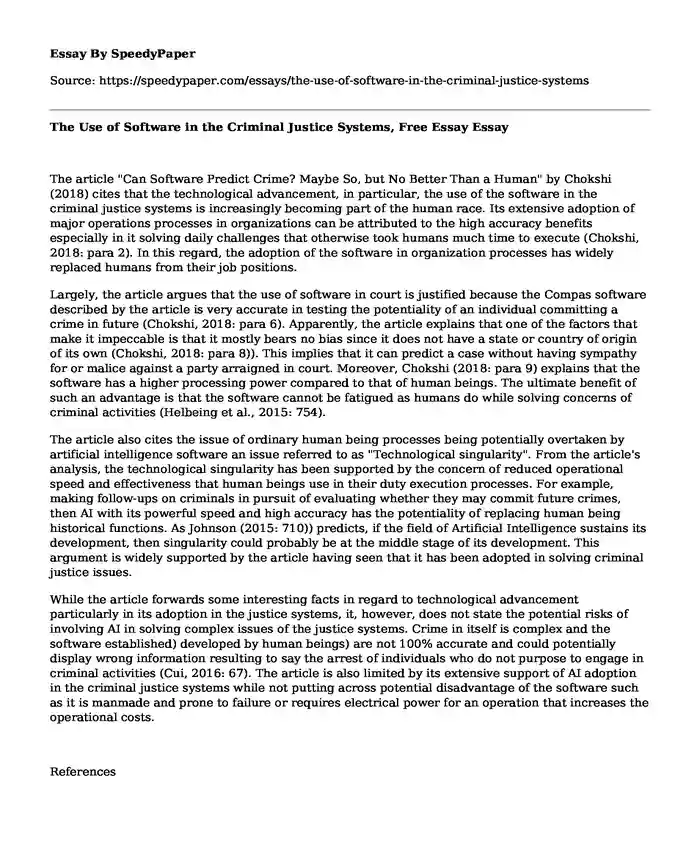
| Type of paper: | Essay |
| Categories: | Software Criminal justice |
| Pages: | 3 |
| Wordcount: | 575 words |
The article "Can Software Predict Crime? Maybe So, but No Better Than a Human" by Chokshi (2018) cites that the technological advancement, in particular, the use of the software in the criminal justice systems is increasingly becoming part of the human race. Its extensive adoption of major operations processes in organizations can be attributed to the high accuracy benefits especially in it solving daily challenges that otherwise took humans much time to execute (Chokshi, 2018: para 2). In this regard, the adoption of the software in organization processes has widely replaced humans from their job positions.
Largely, the article argues that the use of software in court is justified because the Compas software described by the article is very accurate in testing the potentiality of an individual committing a crime in future (Chokshi, 2018: para 6). Apparently, the article explains that one of the factors that make it impeccable is that it mostly bears no bias since it does not have a state or country of origin of its own (Chokshi, 2018: para 8)). This implies that it can predict a case without having sympathy for or malice against a party arraigned in court. Moreover, Chokshi (2018: para 9) explains that the software has a higher processing power compared to that of human beings. The ultimate benefit of such an advantage is that the software cannot be fatigued as humans do while solving concerns of criminal activities (Helbeing et al., 2015: 754).
The article also cites the issue of ordinary human being processes being potentially overtaken by artificial intelligence software an issue referred to as "Technological singularity". From the article's analysis, the technological singularity has been supported by the concern of reduced operational speed and effectiveness that human beings use in their duty execution processes. For example, making follow-ups on criminals in pursuit of evaluating whether they may commit future crimes, then AI with its powerful speed and high accuracy has the potentiality of replacing human being historical functions. As Johnson (2015: 710)) predicts, if the field of Artificial Intelligence sustains its development, then singularity could probably be at the middle stage of its development. This argument is widely supported by the article having seen that it has been adopted in solving criminal justice issues.
While the article forwards some interesting facts in regard to technological advancement particularly in its adoption in the justice systems, it, however, does not state the potential risks of involving AI in solving complex issues of the justice systems. Crime in itself is complex and the software established) developed by human beings) are not 100% accurate and could potentially display wrong information resulting to say the arrest of individuals who do not purpose to engage in criminal activities (Cui, 2016: 67). The article is also limited by its extensive support of AI adoption in the criminal justice systems while not putting across potential disadvantage of the software such as it is manmade and prone to failure or requires electrical power for an operation that increases the operational costs.
References
Chokshi, N. (2018, January 19). Can Software Predict Crime? Maybe So, but No Better Than a Human. Retrieved February 15, 2018, from https://www.nytimes.com/2018/01/19/us/computer-software-human-decisions.htmlCui, X. (2016). The internet of things. In Ethical Ripples of Creativity and Innovation (pp. 61-68). Palgrave Macmillan, London.
Helbing, D., Brockmann, D., Chadefaux, T., Donnay, K., Blanke, U., Woolley-Meza, O., ... & Perc, M. (2015). Saving human lives: What complexity science and information systems can contribute. Journal of statistical physics, 158(3), 735-781.
Johnson, D. G. (2015). Technology with no human responsibility?. Journal of Business Ethics, 127(4), 707-715.
Cite this page
The Use of Software in the Criminal Justice Systems, Free Essay. (2022, Mar 09). Retrieved from https://speedypaper.com/essays/the-use-of-software-in-the-criminal-justice-systems
Request Removal
If you are the original author of this essay and no longer wish to have it published on the SpeedyPaper website, please click below to request its removal:
- An Introduction to Religious Tourism - Free Essay
- Free Essay on How Technology Has Enhanced Education
- Essay Sample with the Research Summary on International Business
- What Does It Mean to Say that Science Is Rational? The Answer Is Inside Our Essay Sample
- Education Essay Example on Competency-Based Assessment
- Essay Sample: The Future of Nursing Informatics
- Free Essay Describing the Influence of President Trump's Administration on Foreign Policy
Popular categories




